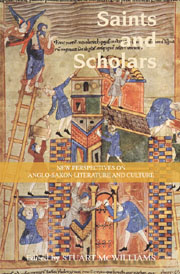 Saints and Scholars
Saints and Scholars Book contents
- Frontmatter
- Contents
- List of Contributors
- Abbreviations
- Introduction
- I Hagiography and the Homiletic Tradition
- 1 A Note on the Sensational Old English Life of St Margaret
- 2 A Place to Weep: Joseph in the Beer-Room and Anglo-Saxon Gestures of Emotion
- 3 Aldhelm's Choice of Saints for his Prose De Virginitate
- 4 Shepherding the Shepherds in the Ways of Pastoral Care: Ælfric and Cambridge University Library, MS Gg.3.28
- 5 “Consider Lazarus”: A Context for Vercelli Homily VII
- 6 More than a Female Joseph: The Sources of the Late-Fifth-Century Passio Sanctae Eugeniae
- 7 Ælfric, Leofric and In Natale Plurimorum Apostolorum
- II Aspects of Community and Consumption
- III Reflections on Old English Scholarship
- Poems
- Hugh Magennis: A Bibliography, 1981–2011
- Index
- Tabula Gratulatoria
3 - Aldhelm's Choice of Saints for his Prose De Virginitate
from I - Hagiography and the Homiletic Tradition
Published online by Cambridge University Press: 05 February 2013
- Frontmatter
- Contents
- List of Contributors
- Abbreviations
- Introduction
- I Hagiography and the Homiletic Tradition
- 1 A Note on the Sensational Old English Life of St Margaret
- 2 A Place to Weep: Joseph in the Beer-Room and Anglo-Saxon Gestures of Emotion
- 3 Aldhelm's Choice of Saints for his Prose De Virginitate
- 4 Shepherding the Shepherds in the Ways of Pastoral Care: Ælfric and Cambridge University Library, MS Gg.3.28
- 5 “Consider Lazarus”: A Context for Vercelli Homily VII
- 6 More than a Female Joseph: The Sources of the Late-Fifth-Century Passio Sanctae Eugeniae
- 7 Ælfric, Leofric and In Natale Plurimorum Apostolorum
- II Aspects of Community and Consumption
- III Reflections on Old English Scholarship
- Poems
- Hugh Magennis: A Bibliography, 1981–2011
- Index
- Tabula Gratulatoria
Summary
The writings of Aldhelm of Malmesbury (c. 639–709) provide some of the earliest evidence for hagiographical activity in Anglo-Saxon England. Preceding his more famous contemporary, the Venerable Bede, by a generation, he is thought to have been born in Wessex within a decade of the conversion of that region to Christianity, quite possibly into the West Saxon royal family that played such an instrumental role in the promotion of the new faith. He enjoyed a career that brought him into contact with some of the most prominent churchmen of his day and bore witness to some of the most important developments of the early English Church. Aldhelm has been justly described as the first English man of letters: he was the author of two treatises on the Latin hexameter, composed a series of Enigmata that would influence later writers in both Latin and Old English, wrote a collection of poems to commemorate the dedication of churches, and compiled a large composite work addressed to King Aldfrith of Northumbria known as the Epistola ad Acircium. Aldhelm's fame, however, rests chiefly upon his opus geminatum (‘twinned work’), the De Virginitate, the only one of Aldhelm's works to be described in any detail in Bede's Historia Ecclesiastica:
Scripsit et de uirginitate librum eximium, quem in exemplum Sedulii geminate opere, et uersibus exametris, et prosa composuit. Scripsit alia nonnulla, utpote uir undecemque doctissimus; nam et sermone nitidus, et scripturarum, ut dixi, tam liberalium quam ecclesiasticarum erat eruditione mirandus. […]
- Type
- Chapter
- Information
- Saints and ScholarsNew Perspectives on Anglo-Saxon Literature and Culture in Honour of Hugh Magennis, pp. 33 - 53Publisher: Boydell & BrewerPrint publication year: 2012


